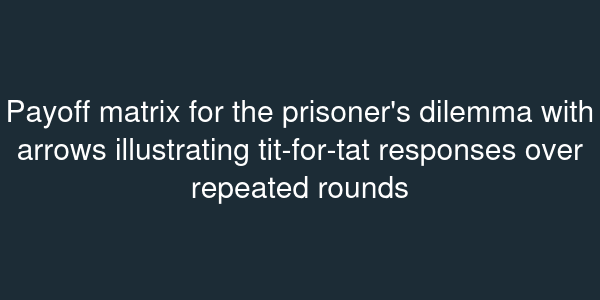Cooperation and Repeated Games
Essential Questions
- How do repeated interactions change strategic incentives?
- Why do tit-for-tat and reciprocity strategies work in repeated prisoner's dilemmas?
- How do discount factors and noise affect cooperation?
Overview
Two firms repeatedly decide whether to collude or compete. One deviation yields a short-term gain but risks retaliation. Repeated game theory shows that cooperation can be sustained if the future matters enough.
This lesson reviews the infinite-horizon prisoner's dilemma, analyzes tit-for-tat and grim trigger strategies, and examines the role of noise, forgiveness, and reputation.
The Prisoner's Dilemma Repeated
In the one-shot prisoner's dilemma, defecting dominates. Payoffs: mutual cooperation yields 3, mutual defection yields 1, unilateral defection yields 5 for the defector and 0 for the cooperator. In the infinitely repeated game with discount factor , tit-for-tat (start cooperative, then copy the partner's last move) can sustain cooperation. The average payoff from constant cooperation is . The temptation to defect yields if the opponent retaliates with defection forever. Cooperation is sustainable if , simplifying to .

Strategies and Noise
Grim trigger punishes once and forever: cooperate until the partner defects, then defect forever. It sustains cooperation when as well. However, in noisy environments where defections may be accidental, grim trigger is too harsh. Strategies like "win-stay, lose-shift" (cooperate if both cooperated last round; otherwise switch) or generous tit-for-tat (forgive with some probability) handle noise better.
Applications
International climate agreements rely on repeated interactions. Countries commit to emissions cuts knowing future meetings allow enforcement via reputation. In labor markets, long-term employment relationships foster cooperation through performance bonuses and implicit contracts.
Digital platforms run repeated games between buyers and sellers. Reputation systems approximate tit-for-tat by rewarding good behavior and penalizing defection. When discount factors are low (short-term focus), regulators often intervene.
Understanding repeated games equips you to evaluate when cooperation is credible and when external enforcement is needed.